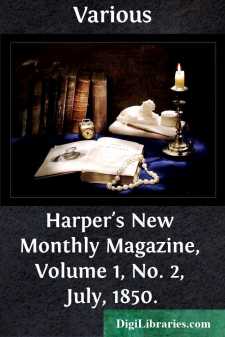Categories
- Antiques & Collectibles 13
- Architecture 36
- Art 48
- Bibles 22
- Biography & Autobiography 813
- Body, Mind & Spirit 142
- Business & Economics 28
- Children's Books 15
- Children's Fiction 12
- Computers 4
- Cooking 94
- Crafts & Hobbies 4
- Drama 346
- Education 46
- Family & Relationships 57
- Fiction 11828
- Games 19
- Gardening 17
- Health & Fitness 34
- History 1377
- House & Home 1
- Humor 147
- Juvenile Fiction 1873
- Juvenile Nonfiction 202
- Language Arts & Disciplines 88
- Law 16
- Literary Collections 686
- Literary Criticism 179
- Mathematics 13
- Medical 41
- Music 40
- Nature 179
- Non-Classifiable 1768
- Performing Arts 7
- Periodicals 1453
- Philosophy 64
- Photography 2
- Poetry 896
- Political Science 203
- Psychology 42
- Reference 154
- Religion 513
- Science 126
- Self-Help 84
- Social Science 81
- Sports & Recreation 34
- Study Aids 3
- Technology & Engineering 59
- Transportation 23
- Travel 463
- True Crime 29
Harper's New Monthly Magazine, Volume 1, No. 2, July, 1850.
by: Various
Description:
Excerpt
When "Gilfillan's Gallery" first appeared, a copy of it was sent to an eminent lay-divine, the first sentence of whose reply was, "You have sent me a list of shipwrecks." It was but too true, for that "Gallery" contains the name of a Godwin, shipwrecked on a false system, and a Shelley, shipwrecked on an extravagant version of that false system—and a Hazlitt, shipwrecked on no system at all—and a Hall, driven upon the rugged reef of madness—and a Foster, cast high and dry upon the dark shore of Misanthropy—and an Edward Irving, inflated into sublime idiocy by the breath of popular favor, and in the subsidence of that breath, left to roll at the mercy of the waves, a mere log—and lastly, a Coleridge and a De Quincy, stranded on the same poppy-covered coast, the land of the "Lotos-eaters," where it is never morning, nor midnight, nor full day, but always afternoon.
Wrecks all these are, but all splendid and instructive withal. And we propose now—repairing to the shore, where the last great argosy, Thomas De Quincey, lies half bedded in mud—to pick up whatever of noble and rare, of pure and permanent, we can find floating around. We would speak of De Quincey's history, of his faults, of his genius, of his works, and of his future place in the history of literature. And when we reflect on what a mare magnum we are about to show to many of our readers, we feel for the moment as if it were new to us also, as if we stood—
"Like stout Cortea, when with eagle eyesHe stared at the Pacific,
——and all his men
Gathered round him with a wild surmise,
Silent, upon a peak of Darien."
We can not construct a regular biography of this remarkable man; neither the time for this has come, nor have the materials been, as yet, placed within reach of us, or of any one else. But we may sketch the outlines of what we know, which is indeed but little.
Thomas De Quincey is the son of a Liverpool merchant. He is one of several children, the premature loss of one of whom he has, in his "Suspiria de Profundis" (published in "Blackwood") most plaintively and eloquently deplored. His father seems to have died early. Guardians were appointed over him, with whom he contrived to quarrel, and from whose wing (while studying at Oxford) he fled to London. There he underwent a series of surprising adventures and severe sufferings, which he has recounted in the first part of his "Opium Confessions." On one occasion, while on the point of death by starvation, his life was saved by the intervention of a poor street-stroller, of whom he afterward lost sight, but whom, in the strong gratitude of his heart, he would pursue into the central darkness of a London brothel, or into the deeper darkness of the grave. Part of the same dark period of his life was spent in Wales, where he subsisted now on the hospitality of the country people, and now, poor fellow, on hips and haws. He was at last found out by some of his friends, and remanded to Oxford. There he formed a friendship with Christopher North, which has continued unimpaired to this hour. Both—besides the band of kindred genius—had that of profound admiration, then a rare feeling, for the poetry of Wordsworth. In the course of this part of his life he visited Ireland, and was introduced soon afterward to OPIUM—fatal friend, treacherous ally—root of that tree called Wormwood, which has overshadowed all his after life. A blank here occurs in his history. We find him next in a small white cottage in Cumberland—married—studying Kant, drinking laudanum, and dreaming the most wild and wondrous dreams which ever crossed the brain of mortal. These dreams he recorded in the "London Magazine," then a powerful periodical, conducted by John Scott, and supported by such men as Hazlitt, Reynolds, and Allan Cunningham. The "Confessions," when published separately, ran like wildfire, although from their anonymous form they added nothing at the time to the author's fame....












